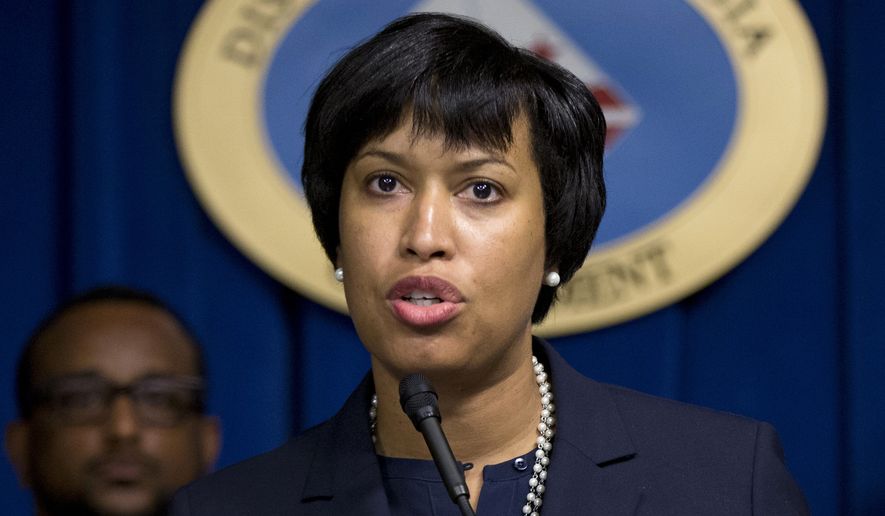Proponents of the District’s new paid family leave law are pushing back against lawmakers who want to change how it is funded in order to relieve the burden on local businesses.
The law, which provides up to eight weeks of family or medical leave to private-sector workers in the city, is funded by a 0.62 percent payroll tax. The paid leave program is to be administered by the city, not the businesses themselves — at a cost of $250 million a year.
“The debate about the funding mechanism seems like a rehash of what’s happened for the past 18 months,” D.C. Council member Elissa Silverman, the program’s most vocal supporter, said Monday in an interview. “We had a thorough and thoughtful policy discussion. Now it’s time to move forward.”
On Friday council Chairman Phil Mendelson, who shepherded the paid leave bill through a contentious legislature, took to Twitter to announce his openness to other financing ideas.
“No harm in looking at alternative proposals,” he tweeted Friday, less than 24 hours after Mayor Muriel Bowser had declined to veto the legislation. “Discussion of any changes will be against the backdrop that bill we passed in Dec. is law.”
He said the law’s benefits package would not change, but it wouldn’t hurt to look at other ways to pay for the program.
“If we can have benefits at a lower tax rate, and ensure compliance for all, then we may have a better package,” Mr. Mendelson said. “The Idea is to put out different concepts for this discussion.”
But D.C. Chamber of Commerce President Vincent Orange said Monday that Mr. Mendelson’s willingness to consider financing options is an “acknowledgment that the bill is flawed.”
“We have to find a way to create a responsible bill that wouldn’t create a tax burden on businesses,” said Mr. Orange, a former council member.
He suggested an employer mandate plan that would subsidize small businesses, saying he hopes all voices will be heard in the upcoming debate.
“Then we’ll have more of a consensus piece that we can live with,” Mr. Orange said in an interview. “Everybody doesn’t get what they want but can get what they can live with.”
Early drafts of the legislation called for as much as 16 weeks of paid leave and a 1 percent payroll tax, but Mr. Mendelson scaled back the bill’s duration and funding mechanism.
When the revised bill was released in November, the chairman was adamant that he’d done his best to appease labor advocates and business owners. He went so far as to promise the business community to support a two-year moratorium on bills that would “have a disparate impact on District employers.”
Mr. Mendelson’s comments on Friday sat well with Miss Bowser, with whom the chairman has had a strained relationship over the last two years.
“The mayor thinks the chairman’s recent comments are very encouraging, not just because of the potential for a lower burden on businesses, but most importantly the opportunity to make changes that ensure a majority of the benefits actually help D.C. families and not residents of Maryland and Virginia,” Bowser spokesman Kevin Harris told The Washington Times on Monday. “The mayor still believes these are two critical flaws of the current legislation.”
Nearly two-thirds of the District’s 532,000 workers live in Maryland or Virginia, and likely would spend their paid leave benefits outside the city.
Two groups that championed the bill during the 15 months it made its way through the council criticized any effort to change the program.
“This is not the time to revisit a bill that passed with the overwhelming support of both the Council and District residents,” said Valerie Ervin, senior adviser for Working Families Party. “The D.C. Council should take the lead in implementing this much needed program instead of bowing to business interests who want to slow down progress.”
Jews United for Justice Executive Director Jacob Feinspan said Mr. Mendelson should implement the law as it was enacted and not waste time renegotiating it.
“Working families expect that Chairman Mendelson will keep his word and stand strong to corporate pressure,” Mr. Feinspan said. “Derailing a strong paid leave program, supported by more than 80 percent of District residents, would be snatching defeat from the jaws of victory.”
• Ryan M. McDermott can be reached at rmcdermott@washingtontimes.com.




Please read our comment policy before commenting.